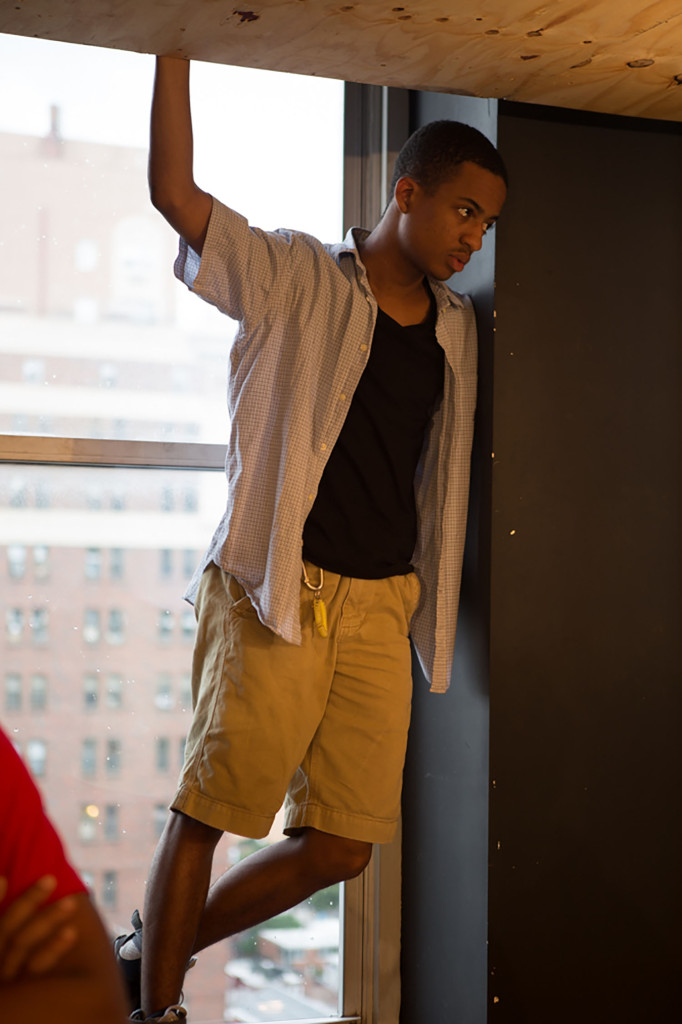
Turn on the news and you will be reminded that racism has not disappeared in the United States. As the nation mourns Michael Brown, Tamir Race, Freddie Gray, and countless other victims of over zealous policing, Flashpoint Theatre Company’s HANDS UP: 6 PLAYWRIGHTS, 6 TESTAMENTS attempts to make sense of this injustice. Commissioned by The New Black Fest and directed by Joanna Settle—head of the Ira Brind School of Theatre Arts at University of the Arts, the venue for this production—the play consists of six African American male writers each offering a viewpoint on how systemic and de facto racism has impacted their lives. HANDS UP not only seeks to contribute to the national dialogue on race, but also reminds us why this conversation is not yet over.
With no overarching story save for the common motifs and themes that tie these testaments together, HANDS UP offers monologues by Nathan James, Nathan Yungenberg, Idris Goodwin, Glen Gordon, Eric Holmes, and Dennis Allen II strung together with music by local band Ill Doots. The first monologue, Superiority Fantasy, speaks to Nathan James’s personal experience of police threatening his life on multiple occasions, simply because he “fit a description” of a criminal. Brandon J Pierce delivers a nuanced performance of James’s work, angrily lashing out at the police and universality of white hatred while remaining likable and truthful. Later, Aaron Bell gives a similarly deft, charming, and heartbreaking performance of Glen Gordon’s monologue Abortion. In Abortion, Bell bids farewell to the child he’ll never have, citing his failure to improve the world for his children’s sake as his parents did for his. But, he reveals in a dark twist, he will soon take action.
While the main focus of HANDS UP remains black men’s interactions with police, Holes in My Identity (by Nathan Yungenberg, performed by Brian Anthony Wilson), slightly changes the pace. Instead of fearing for his life at the hands of police, Yungenberg reflects on his privileged childhood, and how it makes him feel like an outside viewer to the play’s themes instead of an active participant. Further reflection on identity and privilege continues in Walking Next to Michael Brown, written by Eric Holmes and performed by EZ Hernandez. Holmes criticizes those of mixed race who further prejudice by subscribing too much to white culture, thus selling out their black ancestry. However, the piece falls short in its disorganized structure, attacking a wide range of issues without grounding itself firmly enough in one narrative center point. They Shootin! Or I Ain’t Neva Scared… while also falling short compared to other monologues in the play, somehow also serves as one of HANDS UP’s most important stories by highlighting contemporary white America’s most egregious sin – the dismissal and marginalization of African-American experience, by sweeping race under the rug, and in pretending it’s a non-issue, letting racism fester and maintain its strength over the decades since the Civil Rights Movement.
The evening draws to a close with How I Feel by Dennis Allen II, performed by Lee Edward Colston II. Colston channels Allen’s fear and rage by imploring the audience to keep their hands raised in surrender through the monologue’s entirety. Thus inducing physical discomfort in the audience, How I Feel captures the play’s goal to unsettle and motivate us viewers. As Colston remains a constant presence in the background throughout the play, it was a great relief to finally hear this talented actor speak. This final speech summarizes the hope for the future, but primarily fear and anger, which HANDS UP embodies.
As the play went on, the audience watched the sun set behind the Philadelphia skyline. With its minimal set and lighting (both designed by Thom Weaver),, HANDS UP is an intimate experience, stripping away the non-essentials of live theater to confront its audience to examine our moment in American history and to beseech us to listen and question the deadly racist practices of our public servants. Ill Doots’ musical contribution—and the very fact that they are intrinsic to the performance—deserve special praise; HANDS UP delivers us new theatrical form, fresh talent, and fuel for social change. [Caplan Studio Theatre, 211 South Broad Street, 16th Floor.] June 10-June 28, 2015; flashpointtheatre.org..
